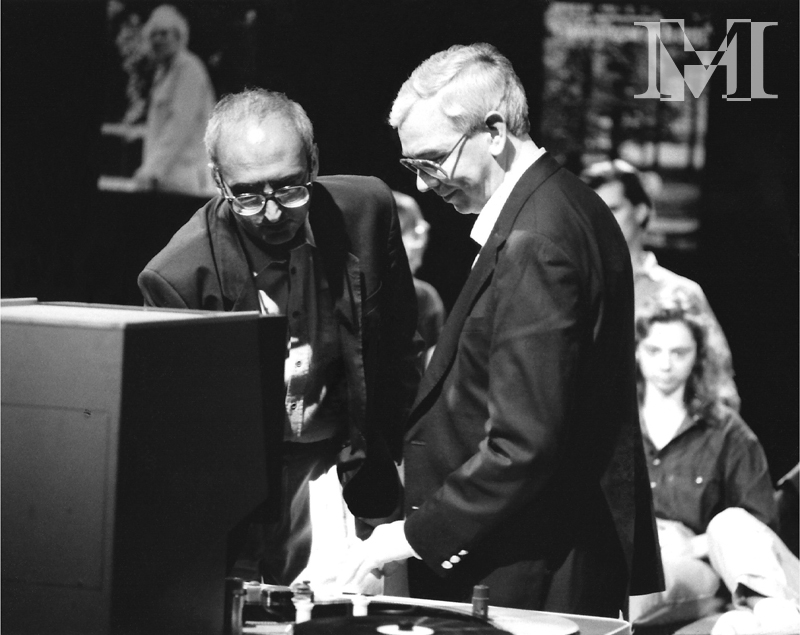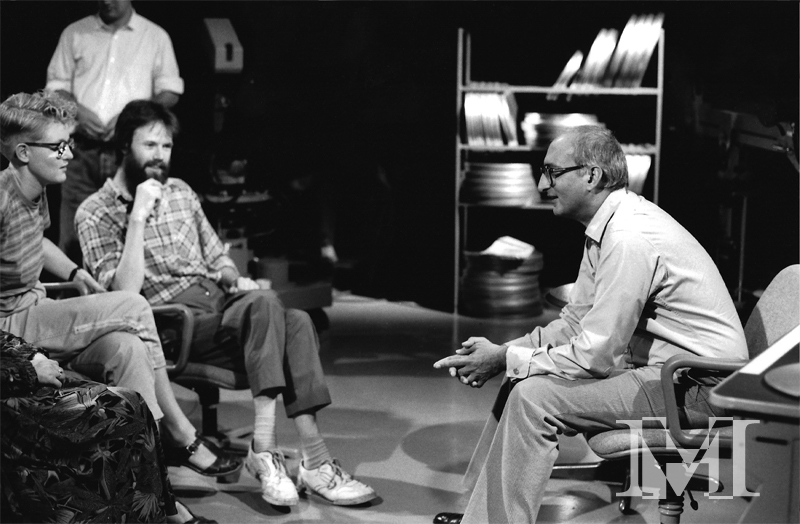Press reviews of the Movie Masterclass series on Channel Four
A warm and disbelieving welcome to Channel Four’s MOVIE MASTERCLASS. Can it be that a serious programme about cinema has hit the air waves? Mamoun Hassan comes top with a sharp-eyed look at SEVEN SAMURAI.
A medium (tv) shaped by divine providence as the perfect tool for close discussion of another medium (cinema) has at last woken up to this noble vocation.
Nigel Andrews Financial Times
When Mamoun Hassan drew our attention to the glorious and in no way accidental eloquence of the brief sequence where the SEVEN SAMURAI race in single purposeful file through the wheatfield towards a point of menace, a new respect for the creative imagination and purpose which goes into true film making must have begun to grow in many a viewer.
If there was a MOVIE MASTERCLASS every week, eventually we could have a stirring of that holy discontent which can create a space in which good work thrives and survives.
Peter Lennon The Listener
Mamoun Hassan does a mean close reading of SEVEN SAMURAI.
MOVIE MASTERCLASS may be a rare instance of television doing something to protect that semi-mythical species, ‘visual literacy’.
Kevin Jackson The Independent
A perfect use of television.
The effect of MOVIE MASTERCLASS was to throw more light of creative assessment on the rest of television…when you have eaten fresh food it is hard to open a can of beans.
Leslie Garner The Daily Telegraph
After forty years of television programmes about cinema, it is ironic that MOVIE MASTERCLASS should appear such a revolutionary concept. The masterstroke of the series is to present them not as direct-to-camera lectures but as Socratic sessions.
David Robinson The Times
MOVIE MASTERCLASS marks a real advance in television discussion of cinema.
Mamoun Hassan is very good on the complex interplay between movement and stillness in SEVEN SAMURAI.Colin MacArthur New Statesman and Society
It is exactly this sort of careful, caring programme, which takes sides, and ideas, and art, and society, and most of all perhaps television, seriously that makes our broadcast system the envy of others.
Film Director Gavin Millar The Listener
References in press articles
The Times
‘Interview: Mamoun Hassan – A shining example‘ by David Robinson
Published: 18 September, 1984
The Financial Times
‘Cinematic poetry’ by Harry Eyres
Published: September 5, 2009
‘People of all ages need a cultural space’ by Harry Eyres
Published: July 30, 2005
Following a visit to the Rex Cinema in Berkhamsted, Herts, where Mamoun introduced Machuca
The Guardian
‘Films we forgot to remember‘ by John Patterson
16 May 2008
References in publications
Dictionnaire du Cinéma (2nd edn), Jean-Loup Passek, Larousse, 1995
Under ‘Grande Bretagne’
On peut penser que pour l’establishment’ (la ‘bonne société’), le cinéma reste un monde et une carrière peu recommendables, où il est normal que des étrangers (d’Alexandre Korda à Mamoun Hassan, en passant par Del Giudice pour parler des producteurs, et René Clair, Cavalcanti, Truffaut, Polanski, Losey ou Kubrick pour parler de réalisateurs) se fassent à l’occasion plus britanniques que les Britanniques eux-mêmes.
… It is possible to think that for the ‘establishment’ (‘good society’) cinema remains a world and a career not to be recommended, where it is normal for foreigners (from Alexander Korda to Mamoun Hassan, by way of Del Giudice, speaking of producers, and René Clair, Cavalcanti, Truffaut, Polanski, Losey or Kubrick, speaking of directors) to make themselves sometimes more British than the British themselves. …
Under ‘Dates in British cinematographic history’
—1970 : production de 70 longs métrages. — Sur la recommandation du Rapport Lloyd, le gouvernement accorde un prêt de £5m à NFFC. — Création du BFI Production Board, confié à Mamoun Hassan. Il occupera ce poste jusqu’en 1976. — EMI and MGM s’associent pour gérer les studios d’Elstree. Développement et régionalisation du National Film Theatre.
1970: 70 full-length features produced. — On the recommendation of the Lloyd Report, the government gives a grant of £5m to the NFFC. — Creation of the BFI Production Board, entrusted to Mamoun Hassan, who will occupy this post until 1976. — EMI and MGM join together to run Elstree studios. — Development and regionalisation of the National Film Theatre.
— 1979 : le gouvernement conservateur, nouvellement élu, ne donne pas suite au projet BFA. — Mamoun Hassan quitte le BFI Production Board pour NFFC. — Publication des comptes du Eady Fund : on découvre qu’il aide surtout les gros films (dont des films américains) et meme des films pornographiques!
— 1979: the newly elected Conservative government does not follow through on the British Film Authority project [proposed by the Wilson Labour government]. — Mamoun Hassan leaves the BFI Production Board for the NFFC [after making films for UNRWA in Lebanon between 1976 and 1979]. — Publication of the Eady Fund accounts, revealing that the fund helps mostly big films (some American films among them) and even pornographic films!
Others
Mamoun figures prominently in the line-up in Alexander Walker’s book on British cinema, National Heroes, Harrap , 1985.
‘Entretien avec Mamoun Hassan’, POSITIF, Revue de Cinéma 277, mars 1984.
Articles
Mamoun has written widely on different aspects of cinema through his reviews.
From Mamoun Hassan’s book on Kurosawa (in preparation):
From the Times Higher Education Supplement:
Lindsay Anderson: The fechter who fought for life
Alexander Mackendrick: Any fool can see that
David Lean: Blithe cutting spirit
Billy Wilder: Stepping out with Wilder
Gillo Pontecorvo’s The Battle of Algiers: The human face of torture
Akira Kurosawa: One cut that really gets under the skin
John Ford: The son of a bitch who happened to be a genius
Hollywood: Shooting from the hip
Stanley Kubrick: The prints of darkness
Stephen Spielberg: Home is where the art is
Martin Scorsese on American cinema: Goodfella seduced by sin
Fritz Lang: Beauty and the beast
Jean Renoir’s La grande illusion and La règle du jeu: Tableaux glorying in sawn-off corners
Film magazine Enthusiasm: Blunt phoenix pits itself against Hollywood
Lindsay Anderson: The virgin queen and his progeny
Producers: Behind the scenes on screen, who has the vision thing?
Shakespeare and the moving image: Sex, violence and bard language
The Oxford History of World Cinema: Lights, camera, inaction
For the Guardian:
Bill Douglas obituary: His pain was our pain
British film industry: Britain and the lucky strike syndrome
For the Observer Magazine:


